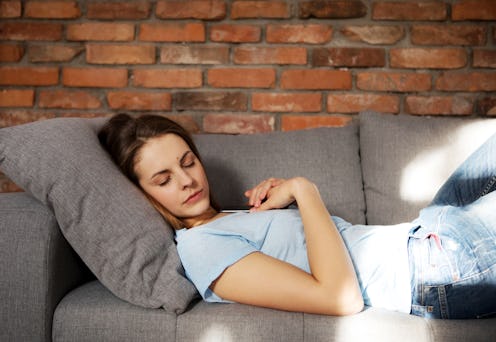Life
Sleep Deprivation And This Have A Lot In Common

You likely already knew that a lack of sleep comes with side effects more serious (and scarier) than simply being tired — but a new study has found that sleep deprivation is like being drunk, reinforcing even further just how crucial it is to your health to get adequate sleep. Full transparency: The study comes from the UK's University of Oxford and the Royal Society for public health, so the focus was on people living in the UK; as such, we'll need to be careful about drawing wide-reaching conclusions about people in other countries from it. That said, though, sleeping (or not sleeping) is pretty universal, so that isn't to say that we can't take away some valuable information from it — no matter where we happen to be.
The researchers found that a shortage of sleep actually leaves us impaired in a way similar to what we experience when we're legally drunk. After 17 hours sleeplessness, our alertness — of lack thereof — isn't too far off what it would be if you had a blood alcohol concentration of 0.05 percent, qualifying you as impaired on the legally drunk scale. However, at 24 hours without sleep, your body behaves the same as it would if you had a BAC of 0.1 percent. FYI, someone is considered legally drunk at 0.08 percent.
You might be thinking that this example of a lack of sleep sounds extreme, but it really isn't. I myself have had plenty of days that have run longer than 17 hours, and I can say from experience that by the end of the night (before then, really), I feel like absolute garbage. Luckily, I'm usually safe and sound in my own home. What about people who have been working all day and then have to get behind the wheel of a car?
Sleeplessness is a bigger problem than you might think; in fact, these researchers found that poor sleep comes second only to pain as the most common health complaint. The physiological issues stemming from exhaustion have been linked to an increased risk of high blood pressure, stroke, and coronary heart disease. There have even been links made between disrupted sleep and a person's risk of cancer.
And while the current study was conducted in the UK, conditions are no better in the United States. Somewhere between 50 and 70 million American adults have a chronic sleep disorder, and about 33 percent of us sleep less than seven hours each night. Plenty of research has been done here to find that a serious lack of sleep is a pervasive problem for Americans. The Centers for Disease Control and Prevention have declared insufficient sleep a public health problem; it has been linked to motor vehicle crashes, industrial accidents, depression, diabetes, and so much more.
Let's play devil's advocate for a moment: Other studies have found that Americans are getting the minimum recommended hours of sleep — but here's why there's still a problem: The sleep quantity is there, but the sleep quality is less than desirable. 35 percent report their sleep quality as poor or fair, and 20 percent said they don't wake up feeling refreshed. And it's getting worse every year.
We're missing out on shut-eye for a variety of reasons. Cell phones don't help. We bring them into bed with us and "play" before we fall asleep. The light coming from our phones messes with our internal clocks, telling our bodies it's still daytime and that we need to be alert. Also, we're workhorses. There's absolutely a mentality here that, especially in our younger years, we should work as hard and as long as we can. Having a strong work ethic is great, but not at the expense of your health.
The recent findings from the UK study are a powerful reminder that it's absolutely vital to get adequate sleep — for your mental and physical health, and for the safety of those around you.